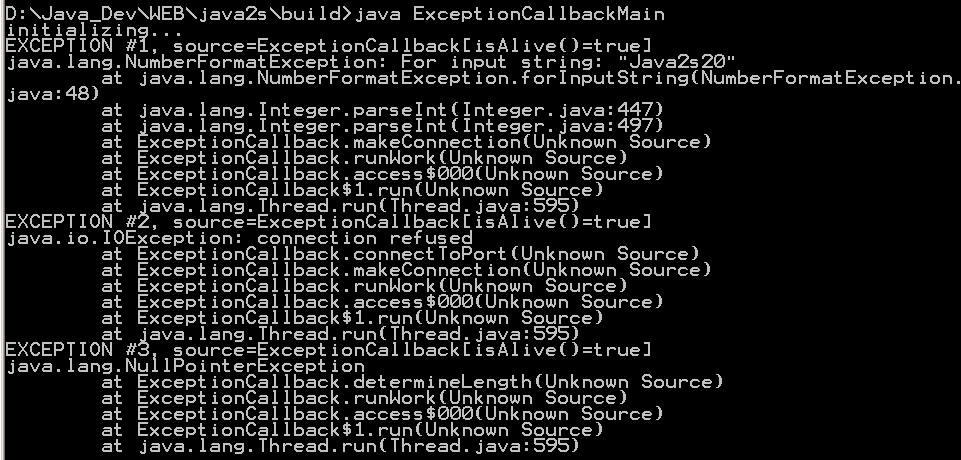Exception call back

import java.io.IOException;
import java.util.Collections;
import java.util.HashSet;
import java.util.Iterator;
import java.util.Set;
public class ExceptionCallbackMain extends Object implements ExceptionListener {
private int exceptionCount;
public ExceptionCallbackMain() {
exceptionCount = 0;
}
public void exceptionOccurred(Exception x, Object source) {
exceptionCount++;
System.err.println("EXCEPTION #" + exceptionCount + ", source="
+ source);
x.printStackTrace();
}
public static void main(String[] args) {
ExceptionListener xListener = new ExceptionCallbackMain();
ExceptionCallback ec = new ExceptionCallback(xListener);
}
}
class ExceptionCallback extends Object {
private Set exceptionListeners;
private Thread internalThread;
private volatile boolean noStopRequested;
public ExceptionCallback(ExceptionListener[] initialGroup) {
init(initialGroup);
}
public ExceptionCallback(ExceptionListener initialListener) {
ExceptionListener[] group = new ExceptionListener[1];
group[0] = initialListener;
init(group);
}
public ExceptionCallback() {
init(null);
}
private void init(ExceptionListener[] initialGroup) {
System.out.println("initializing...");
exceptionListeners = Collections.synchronizedSet(new HashSet());
if (initialGroup != null) {
for (int i = 0; i < initialGroup.length; i++) {
addExceptionListener(initialGroup[i]);
}
}
noStopRequested = true;
Runnable r = new Runnable() {
public void run() {
try {
runWork();
} catch (Exception x) {
sendException(x);
}
}
};
internalThread = new Thread(r);
internalThread.start();
}
private void runWork() {
try {
makeConnection();
} catch (IOException x) {
sendException(x);
}
String str = null;
int len = determineLength(str);
}
private void makeConnection() throws IOException {
String portStr = "Java2s20";
int port = 0;
try {
port = Integer.parseInt(portStr);
} catch (NumberFormatException x) {
sendException(x);
port = 80;
}
connectToPort(port);
}
private void connectToPort(int portNum) throws IOException {
throw new IOException("connection refused");
}
private int determineLength(String s) {
return s.length();
}
public void stopRequest() {
noStopRequested = false;
internalThread.interrupt();
}
public boolean isAlive() {
return internalThread.isAlive();
}
private void sendException(Exception x) {
if (exceptionListeners.size() == 0) {
x.printStackTrace();
return;
}
synchronized (exceptionListeners) {
Iterator iter = exceptionListeners.iterator();
while (iter.hasNext()) {
ExceptionListener l = (ExceptionListener) iter.next();
l.exceptionOccurred(x, this);
}
}
}
public void addExceptionListener(ExceptionListener l) {
if (l != null) {
exceptionListeners.add(l);
}
}
public void removeExceptionListener(ExceptionListener l) {
exceptionListeners.remove(l);
}
public String toString() {
return getClass().getName() + "[isAlive()=" + isAlive() + "]";
}
}
interface ExceptionListener {
public void exceptionOccurred(Exception x, Object source);
}
Related examples in the same category